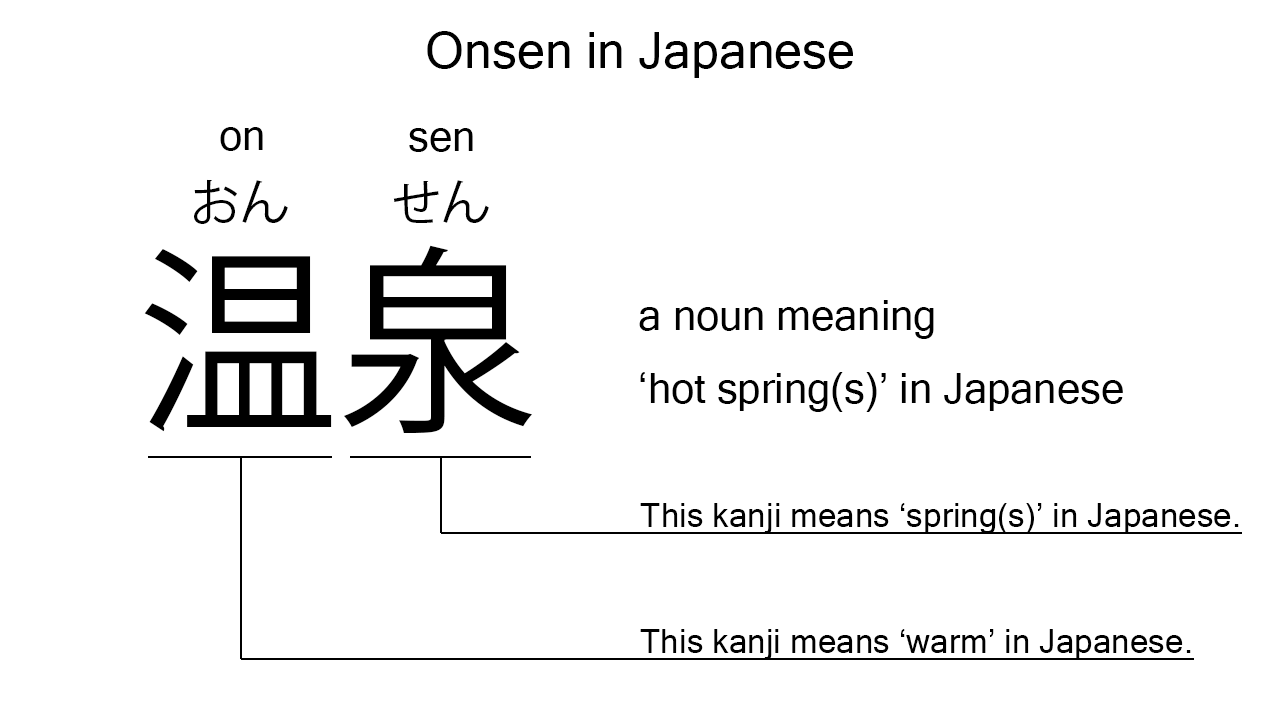What does “onsen” mean in Japanese?
Native speakers say “onsen” to mean ‘hot spring’ in Japanese. Perhaps, some Japanese learners know this word as it is sometimes used in Japanese movies, novels, manga, anime, and the like. In this blog post, however, I will explain this word in detail based on its kanji expression. And also, I will explain how to use it through example sentences. My explanations would help Japanese learners understand “onsen” more clearly. Then, let’s get started!
Contents
Definition and meaning of “onsen”
Let me start with the definition and meaning of “onsen”.
- onsen – 温泉 (おんせん) : a noun meaning ‘hot spring’ in Japanese. This can also work as plural. Learn more about Japanese plural.
The definition and meaning are simple and clear. To understand this noun more clearly, however, let me explain its kanji characters in detail, one by one.
Onsen in kanji
The kanji expression of “onsen” consists of the following two kanji characters:
- 温 : a kanji character used to mean ‘warm’ in Japanese.
- 泉 : a kanji character used to mean ‘spring’ in Japanese.
From these two kanji characters, we can understand that “onsen” literally means ‘warm springs’ in Japanese. This literal interpretation is not completely in line with the actual meaning, but still very close, I think. For some people, hot springs are not that hot, but just warm.

When we meet new kanji expressions, we should check their kanji characters in detail to understand their meanings clearly and deeply. In many cases, kanji characters tell us a lot about the meanings of the expressions they form. Actually, here, we could get the better understanding of “onsen” through the detailed kanji check above.
So far, I’ve explained the definition and meaning of “onsen” together with its kanji characters. Then, let me explain how to use it through the example sentences below.
Example #1: how to say “hot springs” in Japanese
watashi wa onsen ga totemo suki desu – 私は温泉がとても好きです (わたしはおんせんがとてもすきです)
I love hot springs so much.
Below are the new words used in the example sentence.
- watashi – 私 (わたし) : a pronoun meaning ‘I’ in Japanese.
- wa – は : a binding particle working as a case marker or topic marker. In the example, this works after “watashi” to make the subject in the sentence.
- ga – が : a case particle used to make the subject word or the object word in a sentence. In the example, this is used after “onsen” to make the object in the sentence.
- totemo – とても : an adverb of degree meaning ‘very’, ‘much’, or such in Japanese. In the example, this works in front of “suki” to emphasize its meaning.
- suki – 好き (すき) : the stem part of the na-adjective, “sukina”, which means ‘favorite’ in Japanese. Native speakers, however, often use this as an individual word to mean ‘to like’ or ‘to love’ in Japanese. In the example, this is used to mean ‘to love’.
- desu – です : an auxiliary verb used after a noun or adjective to make it sound polite. Probably, this is well known as a part of Japanese desu form. In the example, this is used after “suki” to make it sound polite.
This is a typical usage of “onsen”. In this example, it works together with the case particle, “ga”, to become the object in the sentence.
Example #2: another usage of “onsen”
koko ni onsen ga aru – ここに温泉がある (ここにおんせんがある)
Here is a hot spring.
Below are the new words used in the example sentence.
- koko – ここ : a pronoun used to refer to a place close to the speaker. In the example, this is used to mean ‘here’ in Japanese.
- ni – に : a case particle used to say where something is. In the example, this is used after “koko” to indicate the place where the hot spring is.
- aru – ある : a verb meaning ‘to exist’ or just ‘to be’ in Japanese.
This is another typical usage of “onsen”. In this example, it works as singular to mean a ‘hot spring’ in Japanese. When we want to mean a ‘hot spring’ or ‘hot springs’ in Japanese, anyway, this noun is always a very good option.
Summary
In this blog post, I’ve explained the definition and meaning of “onsen” in detail based on its kanji expression. And also, I’ve explained how to use it through the example sentences. Let me summarize them as follows.
- onsen – 温泉 (おんせん) : a noun meaning ‘hot spring’ in Japanese. This can also work as plural. These two kanji characters literally mean ‘warm springs’ in Japanese. This literal interpretation is not completely in line with the actual meaning, but still very close, I think. For some people, hot springs are not that hot, but just warm.
Hope my explanations are understandable and helpful for Japanese learners.
Leave a Reply